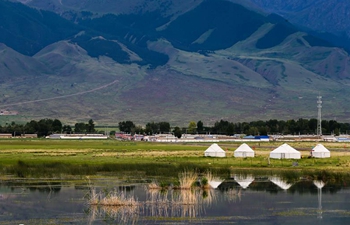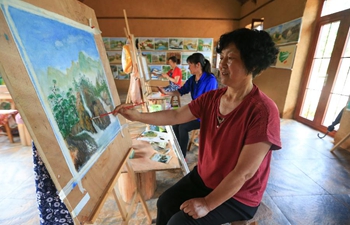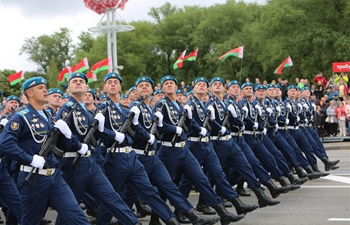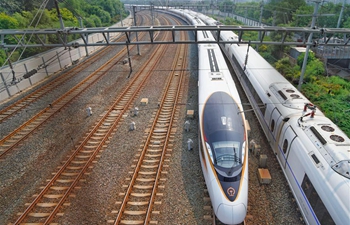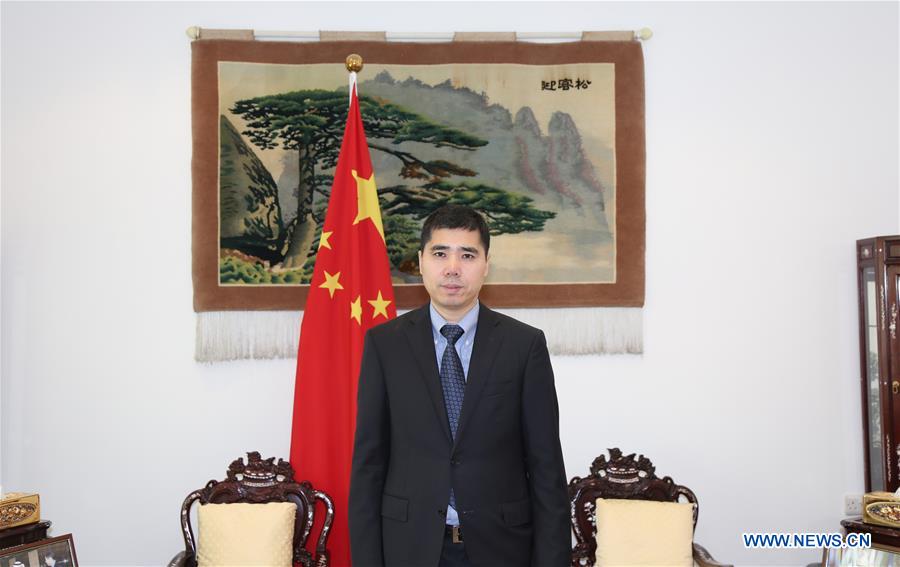
Chinese Ambassador to Kuwait Wang Di poses for a photo during an interview with Xinhua in Kuwait City, Kuwait, on July 3, 2018. The Kuwaiti emir's upcoming visit to China will "inject new impetus into the development of bilateral relations and deepen political mutual trust," Wang Di told Xinhua in a recent interview. (Xinhua/Nie Yunpeng)
KUWAIT CITY, July 6 (Xinhua) -- The Kuwaiti emir's upcoming visit to China will "inject new impetus into the development of bilateral relations and deepen political mutual trust," Chinese Ambassador to Kuwait Wang Di told Xinhua in a recent interview.
"The heads of China and Kuwait will meet again in Beijing after nine years," said the ambassador, ahead of the July 7-10 state visit to China by Kuwaiti Emir Sheikh Sabah Al-Ahmad Al-Jaber Al-Sabah, who will also attend the opening ceremony of the eighth ministerial meeting of the China-Arab States Cooperation Forum (CASCF) in Beijing.
Wang spoke highly of the the traditional friendly relationship between China and Kuwait. "Since the establishment of the diplomatic ties (in 1971), the relations between the two countries have witnessed stable development," he said.
"Since Chinese President Xi Jinping proposed the Belt and Road Initiative in 2013, the cooperation between China and Kuwait has entered a period of fast development," he added.
"This visit is a strategic need to plan and further enhance the development of bilateral relations," Wang said. "It also reflects the great importance the leaders of the two countries attach to the friendly relations between China and Kuwait."
Kuwait is the first Gulf Arab country to establish diplomatic relations with China, and also one of the first Arab countries to have signed a cooperation agreement with China under the Belt and Road Initiative, Wang noted.
The initiative, which comprises the Silk Road Economic Belt and the 21st-Century Maritime Silk Road, aims to build a trade and infrastructure network connecting Asia with Europe and Africa on and beyond the ancient Silk Road trade routes.
The bilateral trade between China and Kuwait has grown rapidly in recent years, Wang pointed out.
China is Kuwait's largest source of imports, as the trade volume between the two countries reached 12.04 billion U.S. dollars in 2017, Wang said, adding that Kuwait is China's fourth largest crude oil supplier in the Arab world.
"In 2017, Chinese companies were implementing 81 construction projects in Kuwait, with a total contract value of 19.53 billion dollars," the Chinese envoy said.
Wang said that Kuwait speaks highly of the Belt and Road Initiative and has actively responded to it.
"The unique geographical advantages of Kuwait make it a natural partner for China to promote cooperation under the Belt and Road Initiative," he said.
The initiative concurs with the vision of the Kuwaiti emir to transform Kuwait into a global center for finance and commerce, said the Chinese envoy.
In February 2010, with an aim to change the country's tradition oil-reliant economic structure, the Kuwaiti government unveiled "Kuwait 2035," a national development strategy to turn the country into a trade and financial hub.
In 2015, the Kuwaiti government announced plans to develop five islands off the eastern coast of the country into free trade zones.
Wang said that China attaches great importance to participating in the development projects in Kuwait under the Belt and Road Initiative.
"In the future, the Chinese side will use its mature expertise in the planning and construction of economic parks and free trade zones and provide advice for the planning, construction and operation of the Kuwaiti projects," he said.
He said that the friendly exchanges between China and Kuwait have always been a model for China's exchanges with regional countries.
China and Kuwait are committed to building a new type of international relationship featuring mutual respect, fairness, justice and win-win cooperation and joining hands in building a community of shared future for mankind, the Chinese diplomat said.
It is in the common interests of the two peoples and will also help strengthen the collective cooperation between China and Arab nations, Wang noted.
The Chinese envoy is confident that the deepening of the China-Kuwait cooperation will not only inject new impetus into the peaceful development of the Arab world, but also contribute to promoting international cooperation and transformation of the global governance system.






